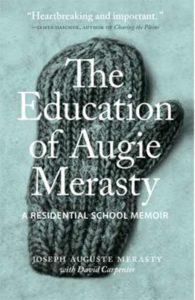Book Review: The Education of Augie Merasty: A Residential School Memoir
This small book was 20 years in the making. Throughout that time, Joseph Augie Merasty sent manuscripts reflecting on his residential school experiences at St. Therese to a man by the name of David Carpenter, acclaimed Saskatchewan author, who skillfully organized them into chronological order (1935 – 1944) and co-authored this book to reflect on those concentrated years. Although there are only 73 pages comprising this book, the contents on each page create an immeasurable and powerful residential school memoir much larger than its size.
Augie Merasty, of Cree descent, sometimes a writer and other times a binge drinker, but always a memorable, captivating, and resilient character, authored this collection of events from his years at residential school after the Working Group on the Truth and Reconciliation Commission and the Exploratory Dialogues, which took place from 1998 to 1999.
Entering St. Therese Residential School at the age of five, Augie shares events from that part of his life—the good, the bad and the horrible, as he remembers them.
Some of the “Sisters” treated him and his peers with kindness and decency, while their fellow “Sisters” and “Brothers” were brutal and inhumane. Punishments were distributed daily in military-like fashion; food was poor in quality and variety (while carts were wheeled by them in the dining room, laden with ample portions of nutritious and colourful cuisine for the “Brothers” in charge of them:
“Right through the centre of the refectory for all us boys and girls to turn and watch, licking our chops, all the beautiful food going past us ten feet away. It happened almost on a daily basis.”
“During the nine years I was at school at St. Therese, even though all those chickens laid eggs, not one student ever once tasted one egg at mealtime.” Augie makes reference to the farm work done at St. Therese, and watching chickens, cows and bulls.
After being released from the school system, Augie “tried a few things” and eventually built a cabin in the woods, lived off of the land—hunting, fishing and snaring his own food, as well as indulging in the spirits of the bottle when the occasion merited or when he sought solace.
Each chapter opens and closes on specific frames of reference in Augie’s experiences and there is only one reference made inferring any sort of vengeance. On page 58, when Augie and his good friend come across one of the “Brothers” who treated them in cruel and merciless forms of discipline, that is where the reader could understand that there was some possible vengeance. The “brother” begs of them repeatedly, “You boys are Roman Catholics; you know you should not kill. It’s the Fifth Commandment of God!”
“Oh yes,” I said (Augie),”but you didn’t remember any Commandments of God when you tortured us for almost five years.”
Augie Merasty wrote this account of his residential school experiences to be put on record, and David Carpenter prepared them for publication, to share with the world. The recounting of the systematic brutality experienced during his childhood amounting to 10 years in residential schools in such a small, non-traditional narrative structured book offers a unique perspective of the truth of colonialism and I recommend reading this memoir to get an understanding of this raw perspective.
The Education of Augie Merasty: A Residential School Memoir by Joseph Auguste Merasty and David Carpenter; University of Regina Press; 113 pages, hardcover; ISBN: 978-0-88977-368-4; $21.95



